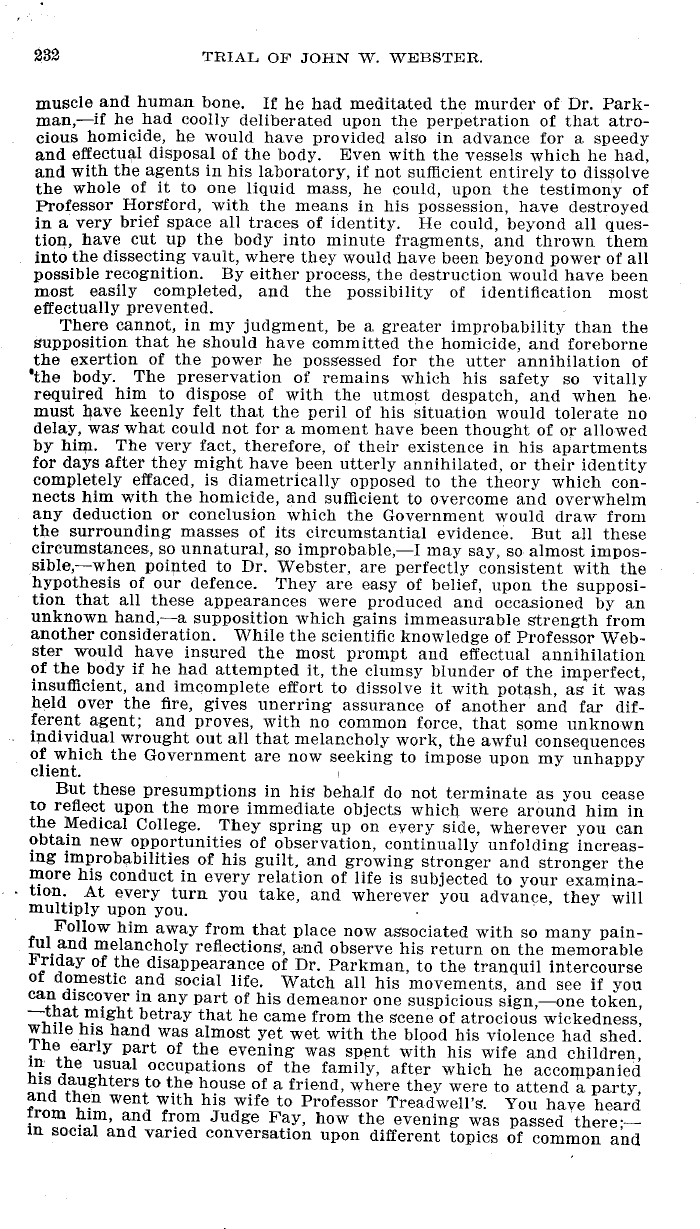|
232 TRIAL OF JOHN W. WEBSTER.
muscle and human bone. If he had meditated the murder of Dr. Park-
man,-if he had coolly deliberated upon the perpetration of that atro-
cious homicide, he would have provided also in advance for a speedy
and effectual disposal of the body. Even with the vessels which he had,
and with the agents in his laboratory, if not sufficient entirely to
dissolve
the whole of it to one liquid mass, he could, upon the testimony of
Professor Horsford, with the means in his possession, have destroyed
in a very brief space all traces of identity. He could, beyond all ques-
tion, have cut up the body into minute fragments, and thrown them
into the dissecting vault, where they would have been beyond power of all
possible recognition. By either process, the destruction would have been
most easily completed, and the possibility of identification most
effectually prevented.
There cannot, in my judgment, be a greater improbability than the
supposition that he should have committed the homicide, and foreborne
the exertion of the power he possessed for the utter annihilation of
'the body. The preservation of remains which his safety so vitally
required him to dispose of with the utmost despatch, and when he,
must have keenly felt that the peril of his situation would tolerate no
delay, was what could not for a moment have been thought of or allowed
by him. The very fact, therefore, of their existence in his apartments
for days after they might have been utterly annihilated, or their identity
completely effaced, is diametrically opposed to the theory which con-
nects him with the homicide, and sufficient to overcome and overwhelm
any deduction or conclusion which the Government would draw from
the surrounding masses of its circumstantial evidence. But all these
circumstances, so unnatural, so improbable,-I may say, so almost impos-
sible,-when pointed to Dr. Webster, are perfectly consistent with the
hypothesis of our defence. They are easy of belief, upon the supposi-
tion that all these appearances were produced and occasioned by an
unknown hand,-a supposition which gains immeasurable strength from
another consideration. While the scientific knowledge of Professor Web-
ster would have insured the most prompt and effectual annihilation
of the body if he had attempted it, the clumsy blunder of the imperfect,
insufficient, and imcomplete effort to dissolve it with potash, as it was
held over the fire, gives unerring assurance of another and far dif-
ferent agent; and proves, with no common force, that some unknown
individual wrought out all that melancholy work, the awful consequences
of which the Government are now seeking to impose upon my unhappy
client.
But these presumptions in his behalf do not terminate as you cease
to reflect upon the more immediate objects which were around him in
the Medical College. They spring up on every side, wherever you can
obtain new opportunities of observation, continually unfolding increas-
ing improbabilities of his guilt, and growing stronger and stronger the
more his conduct in every relation of life is subjected to your exaxnina-
tion. At every turn you take, and wherever you advance, they will
multiply upon you.
Follow him away from that place now associated with so many pain-
ful and melancholy reflections, and observe his return on the memorable
Friday of the disappearance of Dr. Parkman, to the tranquil intercourse
of domestic and social life. Watch all his movements, and see if you
can discover in any part of his demeanor one suspicious sign,-one token,
-that might betray that he came from the scene of atrocious wickedness,
while his hand was almost yet wet with the blood his violence had shed.
The early part of the evening was spent with his wife and children,
in the usual occupations of the family, after which he accompanied
his daughters to the house of a friend, where they were to attend a party,
and then went with his wife to Professor Treadwell's. You have heard
from him, and from Judge Fay, how the evening was passed there;
in social and varied conversation upon different topics of common and
|

